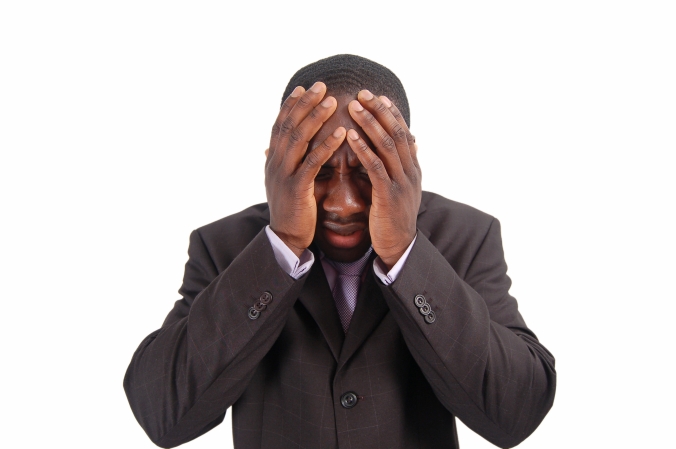I recently heard that one in three people will suffer from anxiety, depression or both at some point during their lives. That’s a lot, but hardly surprising. Almost everywhere I turn I see people struggling with life. Not saying that life should always be easy, but for many it seems to be a bit too gloomy and scary for comfort.
Few things are more stigmatizing in our society than psychological illness, even the relatively mild cases that a large number of people suffer from in silence (Just to clarify, I am not talking about heavy cases of mental illness in this post). You hardly ever meet anyone who openly talk about their problems with anxiety unless it is someone very close to you. Because no one must know that the perfect façade hides a person who is afraid. This is very different from physical conditions that (too?) often seem to be excellent topics for social conversation. People enthusiastically share their problems with migraine, aching backs or cancer with whomever wants to hear, even complete strangers. This is taken to the extreme when people even go on TV to have their hemorrhoids and verrucas exposed and broadcast to the whole world in British reality show Embarrassing Bodies.
Suffering or having suffered from psychological conditions is oftentimes something that people carry with them as a shameful burden for the rest of their lives. A bit like a broken vase. It may well be whole again, but it is forever scarred and considered more fragile compared to one that has never been broken.
I believe one reason we have trouble dealing with anxiety and depression in a healthy way is that these problems by many are not considered health problems, but rather character defects. Sufferers and bystanders alike may therefore think that these are simply weak-minded people who even also may be partly to blame themselves for their problems. Well-meaning advice often includes solutions like pulling themselves together, just cheering up or to not worry so much. Gee, I am sure they hadn’t thought of that already!
Why is it so hard to view this for what it is, namely health issues? You would not tell a cancer patient or someone with chronic back pains to pull themselves together and get well. Yet, telling a teenager struggling with anxiety and depression to do just this seems legitimate to many.
 If one in three develops anxiety or depression during their lives it goes without saying that the causes are numerous. It may be traumatic experiences, stress, substance abuse, abusive relationships, simply being genetically predisposed and lots of other things. My point is that I do not think that the average sufferer from mental disorders is any more responsible for their own condition than patients with more physical troubles. So why the taboo and stigma? Why do people wait in the longest to seek help for their constant sense of impending doom? Or even worse, why do people tolerate this as a natural part of life and deal with it themselves instead of seeking professional assistance? Dealing with this oneself may include self-medicating on drugs and alcohol, becoming abusive themselves or holding it together until total collapse. These are all things that would almost inevitably affect family, friends, colleagues and everyone else around the sufferer.
If one in three develops anxiety or depression during their lives it goes without saying that the causes are numerous. It may be traumatic experiences, stress, substance abuse, abusive relationships, simply being genetically predisposed and lots of other things. My point is that I do not think that the average sufferer from mental disorders is any more responsible for their own condition than patients with more physical troubles. So why the taboo and stigma? Why do people wait in the longest to seek help for their constant sense of impending doom? Or even worse, why do people tolerate this as a natural part of life and deal with it themselves instead of seeking professional assistance? Dealing with this oneself may include self-medicating on drugs and alcohol, becoming abusive themselves or holding it together until total collapse. These are all things that would almost inevitably affect family, friends, colleagues and everyone else around the sufferer.
I am not a health professional and am therefore not really qualified to give any advice on psychological problems, apart from encouraging people to seek help if they feel that life is a bit more difficult than it should be. Seeking help could start with talking about it to a friend or seeing a doctor or therapist. You may be surprised at how many who have experiences to share, either from their own lives or through someone close to them. Experiences that can give hope, guidance and the knowledge that things will get better.
Life is way too short not to be happy. And I am convinced that a lot of people could improve their quality of life if they only would give themselves a break and respect their own limits. Because we all have limits, and depression and anxiety may be your body and mind’s way of telling you that you are pushing it. If you keep pushing it chances are it will say stop in a big way a bit further down the line. And let me tell you: No one will be thanking you the day you hit the wall! Neither your friends, family nor your boss.
I don’t see anxiety and depression as signs of weakness and I don’t think that people who have suffered from this and recovered are more fragile than others. The contrary may actually be the case. In fact some of the most sorted people I know have made their very own personal experiences in this area. People who have felt their own limits, and are aware of them may in fact be living healthier, happier and more sustainable lives in the long run.
As for the vase-metaphor mentioned above, I rather like to think of it as a seam. For isn’t a seam that has been repaired often stronger than the original seam?
Mentally Yours,
Kristian

This is awesome. I still battle with anxiety and depression and it can feel like such a lonely road. Thanks, sometimes a strangers words say just what you ned to hear 🙂
Dear stranger 😉 Thanx for the comment, really made my day! Hope you get the help and support you need. Keep on trudging that road to happy destiny 🙂